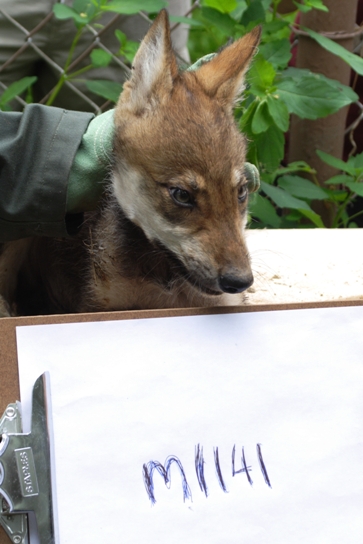16
Apr
Blog: Mexican Wolf M1141 Nears a Wild Future

As a part of ongoing efforts to reintroduce critically endangered Mexican gray wolves into a portion of their ancestral home in the United States southwest and northern Mexico, Mexican gray wolf M1141 was transferred from the Wolf Conservation Center (WCC) in September of 2013 to meet his “bride” at U.S. Fish and Wildlife Service’s (USFWS) Sevilleta Management facility in New Mexico to prep him for his eventual home on the wild landscape of northern Mexico! At Sevilleta, the lobo couple hit it off and even engaged in a copulatory tie in February. Although it’s not definite, the USFWS believes that the female is pregnant. Today, the two took their final stop before receiving the “call of the wild,” they’re en route to a different pre-release facility, Rancho La Mesa, across the boarder in Mexico. M1141 is the third Mexican wolf from the WCC to be chosen for release into the wild.
M1141 was born at the WCC in 2008, and although an average of 9,000 guests visit the WCC annually, visitors have never seen him. M1141 was among 13 wolves that live off-exhibit within the WCC’s 16-acre Endangered Species Facility — a natural environment where these incredibly elusive creatures can reside with minimal human contact. This setting and a strict diet of whole carcass road killed deer safeguards their natural behavior and best prepares them for a wild future.
The Mexican gray wolf or “lobo” (Canis lupus baileyi) is the southernmost and most genetically distinct subspecies of gray wolf in the North America. Once numbering in the thousands, the native species once roamed freely throughout the woodlands of the southwest U.S., and Mexico. Between 1977 and 1980, the last five known wild Mexican wolves in the world were captured in Mexico and used to initiate a captive breeding program.
Mexican wolf reintroduction efforts began fifteen years ago, on March 28, 1998, when 11 captive-reared Mexican gray were released to the wild for the first time in a small portion in the wild southwest. Because the entire existing Mexican wolf population is derived from just 7 lobos saved from extinction, genetic health is the primary consideration governing reproductive pairings and captive-to-wild release events. Both M11411 and his mate have genetic characteristics that will enhance the free-ranging wolf population currently in the wild.
The Mexican wolf remains one of North America’s most endangered mammals. Currently there are only 3 wild wolves living in Mexico and the end of 2013, only an estimated 83 Mexican wolves remained in the United States. Mexican wolves have struggled for a decade and a half, failing to ever reach the initial population goal of 100, and far from reaching the population goal recommended by the current Mexican Wolf Recovery Team’s Science and Planning Subgroup (SPS). The SPS team, scientists appointed by the USFWS Regional Director for their recognized expertise in scientific disciplines relevant to Mexican wolf recovery, recommend that a minimum of three, naturally connected subpopulations of at least 200 individuals each comprising a metapopulation of at least 750 wolves, are essential to the survival and recovery of Mexican gray wolves in the wild. According to WCC director Maggie Howell, “Artificial boundaries, state politics, illegal killings and USFWS’s designation of all wild lobos as an ‘experimental, nonessential’ population, have put recovery in a choke-hold. So the release of these two lobos is an exciting step in the right direction! We’re all incredibly honored to be able to help these wolves resume their rightful place in the wild.”
This article was posted to Wolf Conservation Center’s blog.
_____________________________________________________________________________________________________________________________________________________________________
Click here to join our email list for Mexican gray wolf updates and action alerts.
Visit us on Facebook here.
Click here to join our email list for Mexican gray wolf updates and action alerts.
Visit us on Facebook here.
Photo credit: Wolf Conservation Center – M1141 at 2 weeks old



